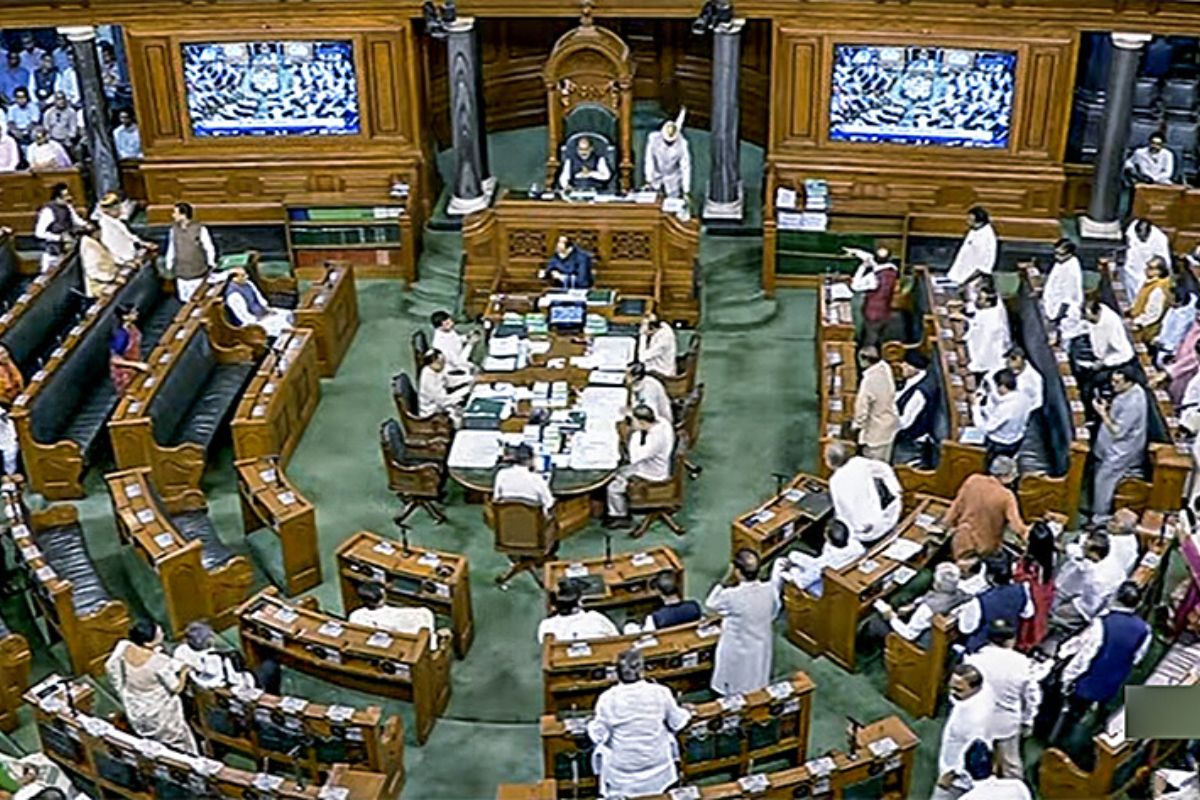Amit Shah releases manifesto for Jharkhand assembly polls, vows to introduce Uniform Civil Code
The BJP leader also pledged to conduct CBI and SIT probes into the cases of ‘paper leak’.
The Opposition maintained that the House did not have legislative competence to pass the Bill.

Home Minister Amit Shah on Tuesday introduced the controversial Government of National Capital Territory of Delhi (Amendment) Bill, 2023 in the Lok Sabha after Speaker Om Birla rejected various objections advanced by the Opposition against its introduction.
The Opposition maintained that the House did not have legislative competence to pass the Bill and argued it was inappropriate to bring significant legislation as long as the government faced a no-confidence motion in the House.
Members of the Opposition tore off some papers and threw them in the air as the home minister was about to rise to introduce the Bill. The Speaker told the slogan-shouting members “how can you behave like this”, and warned that he would be forced to name some members and take action against them. The House was then adjourned for half an hour.
Advertisement
Shah said the Constitution had given full authority to Parliament to legislate regarding any Union Territory and therefore Parliament can pass any law regarding Delhi.
Referring to members’ objections in view of a recent Supreme Court judgement, the home minister said the judgement itself had clarified that Parliament could pass any legislation regarding NCT Delhi. This was mentioned by Mr Pinaki Misra (BJD) while supporting the Government’s right to bring the Bill, Mr Shah said.
Therefore, all objections to the Bill were politically motivated and had no Constitutional basis, the Home Minister said. Quoting the Constitution, Parliamentary Affairs Minister Pralhad Joshi said Parliament is fully competent to pass the Bill.
The Bill seeks to replace the National Capital Territory of Delhi (Amendment) Ordinance, 2023, and seeks to empower the Central government to make all rules in connection with the affairs of the NCT Delhi government including functions, terms and conditions of service of officers and other employees.
The Bill seeks to create a national capital civil services authority, consisting of the chief minister, chief secretary of Delhi, principal home secretary of Delhi which will make recommendations to the lieutenant governor (LG) regarding transfers, postings and vigilance matters of officials.
Opposing the introduction of the Bill, leader of the Congress in the Lok Sabha Adhir Ranjan Chowdhury said the Bill would be an infringement of the rights of the States and make a “graveyard” of federalism. Services are a State subject and the proposed law was anti-Constitution.
Chowdhury said the law would be against the spirit of the Supreme Court judgement in favour of the Delhi Government. The Bill sought to expand the rights of the Lt governor of Delhi and negate the spirit of the Supreme Court judgement.
Mr N K Premachandran (RSP) said he opposed the Bill and questioned the legislative competence of the Central Government to bring a law which is against federalism, which is the basic feature of the Constitution. The Bill would override the Supreme Court judgement.
Asaduddin Owaisi (AIMIM) said the Bill violates Article 123 of the Constitution on separation of powers. There was a Supreme Court judgement against it. The matter should be resolved through division of the House. Saugata Roy (Trinamul Congress) said the Bill would override the judgment of the apex court.
Gaurav Gogoi (Congress) said the Speaker should give ruling whether a substantive legislation can be introduced during the pendency of the no-confidence motion. Shashi Tharoor (Congress) said the Bill would infringe upon the principle of representative democracy. If Delhi’s elected government does not have control over Services, how would they run the administration? T R Baalu (DMK) said since 1956, there has been no substantive matter brought by the Government till a no-confidence motion is disposed of.
Pinaki Misra (BJD) said the Opposition had ignored a paragraph in the Supreme Court judgement which allowed the Government freedom to bring legislation to modify the existing provisions. The government was fully competent to bring the law, he said.
Advertisement